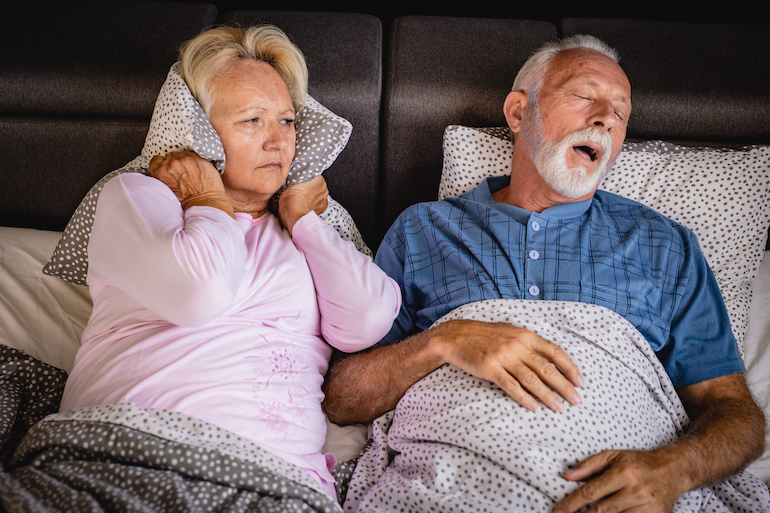
Sleep apnea is a serious condition, but thankfully, treatment options like oral appliance therapy can significantly lessen symptoms and help patients live full, healthy lives. But can sleep apnea ever be cured for good? Is it possible for a person with sleep apnea to no longer have it?
The Basics of Sleep Apnea
To begin, let’s consider what obstructive sleep apnea (OSA) actually is.
By definition, the pauses in breathing during sleep that characterize this condition are caused by a physical blockage in the airway — an enlarged tongue, large tonsils or adenoids, a limp soft palette, or even a deviated nasal septum. These blockages lead to a cessation in breathing, which causes the body to go into panic mode and partially wake up to restore normal respiration. In the most severe cases, these apneic episodes can occur up to 100 times per hour!
Can Sleep Apnea Be Permanently Cured?
Due to the fact that obstructive sleep apnea is the result of anatomical characteristics, the question of a permanent “cure” is complicated to answer.
Ongoing, sleep apnea may be treated by a CPAP machine or an oral appliance. A CPAP is worn nightly and works by opening up the airway with air pressure. CPAP is effective for the treatment of sleep apnea, but many patients find it difficult or impossible to tolerate. Oral appliance therapy, which looks similar to a mouthguard or retainer and projects the jaw forward during sleep to open the airway, is another effective treatment that is generally considered more tolerable for patients. Both CPAP and oral appliances must be worn each night to achieve the desired outcomes for the patient. Yet with consistent use, they can reduce a patient’s score on the apnea hypopnea index (which measures the number of pauses in breathing per hour) to less than five, the number considered by doctors to mean a complete resolution of sleep apnea.
There are surgeries for sleep apnea that can change a person’s anatomy, effectively “curing” the condition, at least in theory. However, success rates vary widely, and in many cases, the condition comes back, leaving patients disappointed.
Oral appliances and CPAP are the overall more reliable option, but for complicated cases, cases in which no other treatment has worked, or at the patient’s request, surgery may be the way to go.
Some surgical options for the treatment of sleep apnea include:
- Uvulopalatopharyngoplasty (UPPP) — This surgery involves removing and/or repositioning various tissues in the mouth and throat to widen the airway, such as trimming the soft palate and uvula. This is the most common surgery for sleep apnea; however, it is often combined with other surgeries, such as tonsillectomies (to remove the tonsils) and adenoidectomies (to remove the adenoids, the glands in the roof of the mouth).
- Septoplasty and Turbinate Reduction — These surgeries open the nasal passage to increase airflow.
- Genioglossus Advancement — This surgery involves pulling the base of the tongue forward, to make the entire tongue firmer and less likely to collapse into the airway during sleep.
The Role of Weight Loss in Treating Sleep Apnea
Weight loss can help all obstructive sleep apnea patients, no matter the severity level. In one study, a 10% weight loss predicted a 26% decrease in AHI (or the apnea-hypopnea index, which measures the severity of sleep apnea). People who are overweight are likely to have excess tissue in the back of their throat, contributing to obstructive sleep apnea — and by losing that weight, a person can effectively alter their anatomy, causing symptoms to be drastically reduced, though not eliminating sleep apnea entirely in most cases.
The challenge for anyone with sleep apnea is that the condition can make weight loss particularly difficult. Not only does it make the sufferer tired, reasonably causing a lack of motivation to exercise, but it has also been shown to affect eating habits. When we’re sleep-deprived, the hormones that manage appetite can fluctuate, causing someone to need to consume more calories than if they were well rested in order to feel satisfied, which leads to weight gain. This creates an unfortunate cycle in which a person feels tired, eats more, and continually gains weight, worsening their sleep apnea symptoms.
So, in order to get out of this cycle, the first step for many patients is to not only start a diet and exercise program, but to also begin proper sleep apnea treatment so they have the energy and will to maintain new, healthy habits.
The Road to a Cure
The word “cure” tends to evoke ideas of a final resolution of a condition, in which the condition goes away forever and never returns again. This is simply not the case for sleep apnea — for most, it’s a lifelong condition. The good news is that consistent treatment can drastically reduce symptoms, helping patients sleep better and have more fulfilled lives.
Our practice doctor, Dr. Jeff Rodgers has helped countless patients improve their sleep and their health with oral appliance therapy. It all starts with a complimentary consultation, which you can quickly schedule by clicking here.
